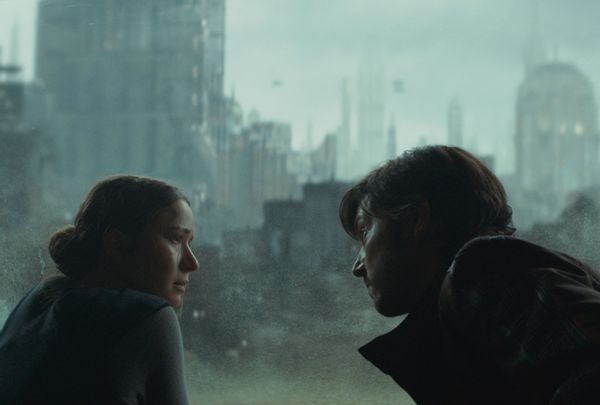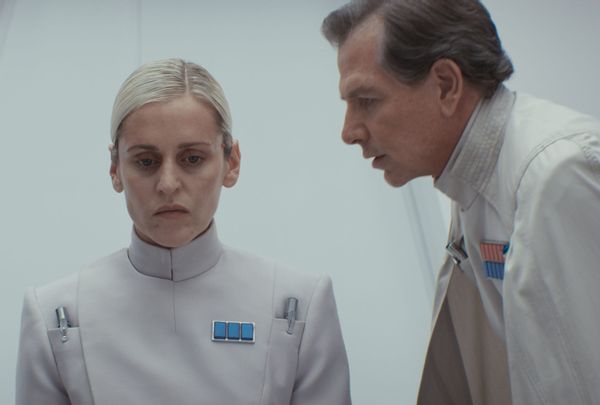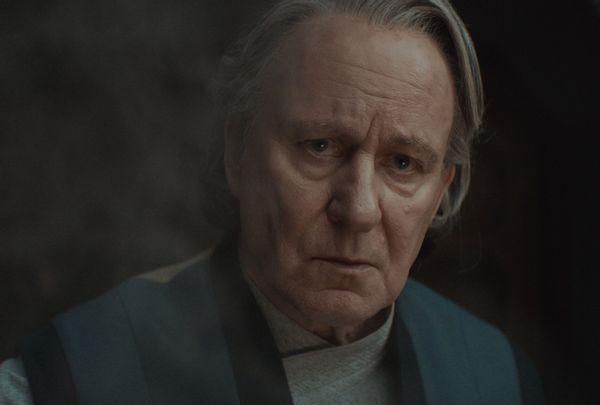On "Andor," good was always a four-letter word

“There will be times when the struggle seems impossible. I know this already. Alone, unsure, dwarfed by the scale of the enemy,” says the disembodied voice. “Remember this: Freedom is a pure idea. It occurs spontaneously and without instruction.”
“Star Wars” and the resulting faith that binds its fandom are built on quotes about the light and dark side of the Force. Since “Andor” is agnostic, its guiding verse is a manifesto recorded by a revolutionary, Karis Nemik (Alex Lawther), whose name and face have likely been forgotten by most viewers. Nemik was a minor character in three episodes of the show's first season before dying in an accident, crushed by a heavy object falling on him during a small-scale heist.
If the Empire requires blood or material resources, it will concoct a reason to murder anyone and sell that slaughter to the public as reasonable.
Cassian Andor (Diego Luna) barely gets to know this revolutionary philosopher, but somehow, Nemik decides to entrust the mercenary with his recorded thoughts. Five years later, Nemik’s proclamation broadcasts throughout the galaxy. His words are among the last things Imperial Security Bureau (ISB) head Major Partagaz (Anton Lesser) hears as his career sorrily concludes.
“Random acts of insurrection are occurring constantly throughout the galaxy. There are whole armies, battalions that have no idea that they've already enlisted in the cause,” Nemik’s recorded voice says as Partagaz dispiritedly listens. “Remember that the frontier of the Rebellion is everywhere. And even the smallest act of insurrection pushes our lines forward.”
 "Andor" (Lucasfilm/Disney+)“It just keeps spreading, doesn't it?" Partagaz asks his colleague standing by his desk. " . . . Who do you think it is?” The man has no answer, except to gently tell Partagaz that "they" are waiting for him, which isn't good news. Then he allows Partagaz a private moment to “collect his thoughts,” understanding that as code for committing suicide.
"Andor" (Lucasfilm/Disney+)“It just keeps spreading, doesn't it?" Partagaz asks his colleague standing by his desk. " . . . Who do you think it is?” The man has no answer, except to gently tell Partagaz that "they" are waiting for him, which isn't good news. Then he allows Partagaz a private moment to “collect his thoughts,” understanding that as code for committing suicide.
"Jedha, Kyber, Erso," the last ever episode of “Andor,” forgoes conventional finality to bridge the series with the movie that inspired it, 2016’s “Rogue One: A Star Wars Story.” The Jedi Order is largely absent from the movie and show, as is the belief in the Force. In its place, as "Rogue One" hero Jyn Erso says, is the hope that rebellions are built on.
“Andor” doesn’t even aim that high, spiritually speaking, since humans have an irritating habit of clinging to hope and faith instead of dealing with the very real problems in front of our faces. Instead, Gilroy explains the seeds of rebellion in structural terms. Authoritarian rule is on top, upheld by bureaucratic enablers and everyday citizens who go along to get along, never believing stormtroopers will ever have a reason to kick down their doors.
But if the Empire requires blood or material resources, it will concoct a reason to murder anyone and sell that slaughter to the public as reasonable. This asymmetrical dynamic defines the “Star Wars” universe, but since the movies are designed to sell toys, we’re rarely asked to see them as anything more than fables pitting good against evil.
Being constantly assured of one's goodness grows tiresome. That may be why the majority of Disney’s modern “Star Wars” expansions have amounted to little more than flaccid fan service. George Lucas’ space operas raised generations of fans to identify with the good guys, believing they would always triumph over evil. This basic dictum also aligns with the post-World War II American story.
“Andor” comes to us decades after that myth soured, and that may be why it resonates so sharply with modern audiences. We welcomed Tony Gilroy's decision to bring Lucas’ starstruck mythology back down to the dirt. Viewers meet Cassian as a mud-caked child in its first episodes, and wave goodbye to the adult spy and his loyal, snarky droid companion K-2SO (voiced by Alan Tudyk) from the surface of Yavin, the rainy outpost where the rebellion soon scores its first blow.
Being constantly assured of one's goodness grows tiresome. That may be why the majority of Disney’s modern “Star Wars” expansions have amounted to little more than flaccid fan service.
The finale of "Andor," however, waves off any nostalgic impulses. It is meant to bridge its small-screen stories with "Rogue One" and other "Star Wars" tales, which it ably accomplishes. The series as a whole, meanwhile, has been hyperbolically praised as “radical,” which places far too much value on a piece of entertainment, even an excellent one, and its negligible potential to affect real-world social movements.
A more accurate summary of “Andor” and its impact is to call it hauntingly evocative of this American era, particularly in the way it develops its antagonists. That means Partagaz, his top ISB officer Dedra Meero (Denise Gough), her lover and patsy, Syril Karn (Kyle Soller) and Luthen Rael (Stellan Skarsgård).
"Andor" features plenty of standard "Star Wars" Imperial officers enthusiastically serving evil, too. Until this show, they weren’t individualized in a way that explains what they get out of helping a despot destroy planets. But neither do we see the amount of sacrificial blood people like Luthen and his assistant Kleya (Elizabeth Dulau) pour into building pop culture's most famous rebellion.
 "Andor" (Lucasfilm/Disney+). Throughout the series, Luthen steers many unsuspecting people to their deaths in the service of a righteous revolution.
"Andor" (Lucasfilm/Disney+). Throughout the series, Luthen steers many unsuspecting people to their deaths in the service of a righteous revolution.
The final three episodes culminate in this understanding that, since there are no clean definitions of goodness, people like Luthen pay a final price similar to that of Partagaz and Dedra.
Skarsgård's spymaster drives a knife into his torso to prevent Imperial interrogators from agonizingly extracting compromising information, but survives and is hospitalized under guard. Kleya must sneak into the ward where he’s held to finish him off, and is nearly killed for delivering that mercy.
Kleya’s aims are selfless, like most of the other rebels on “Andor.” In contrast, ambition defines and destroys Imperials like Dedra, who pokes her nose where it doesn’t belong and stumbles into the Death Star plans. She doesn’t know her assistant spies for the rebellion; evil empires are never airtight. But when Luthen’s mole delivers this tip of existential importance, his reward is to be murdered before he can tell anyone else. By then, Syril is long dead, dying anonymously during his employer's hostile takeover of a peaceful planet.
If “Andor” maintains its durability, that will be due to its way of reminding us that an unquestioning belief in our goodness can twist us into villains. Perhaps we’re raised to value order and follow authority, conditioning us to believe the people in charge when they identify some part of the population, even our neighbors, as enemies to our neatly arranged existence.
If “Andor” maintains its durability, that will be due to its way of reminding us that an unquestioning belief in our goodness can twist us into villains.
On May the 4th, "Star Wars" Day, the White House circulated a meme depicting Donald Trump as a Jedi with bulging arms, designating “Radical Left Lunatics” as “the Empire” in its X post. It wasn’t lost on people that Trump’s lightsaber is red, the Sith lord’s favored color. When a frightening number of Americans equate goodness with power and dominance, what it means to be good becomes malleable.
Oddly, the chilly realism ruling “Andor” is somehow comforting in this age of rampant political corruption. It’s foolish to hope that the billionaire class presently fleecing American taxpayers will ever face consequences. But we might trust in knowing that while authoritarianism demands loyalty, it also breeds disloyalty.
Want a daily wrap-up of all the news and commentary Salon has to offer? Subscribe to our morning newsletter, Crash Course.
These closing "Andor" episodes include flashbacks to Luthen’s earlier life as an Imperial soldier who turned against the Empire and raised Kleya. She should have been one of his victims. Instead, he raises her to be a resistance fighter.
At the same time, true believers like Dedra are warned that their willingness to follow morally reprehensible orders to the letter won't save them when the Empire falls apart. Our last glimpse of Dedra shows her shoeless and cowering in a prison cell, destined to be as forgotten as her boss and every other underling who fails the Emperor.
 "Andor" (Lucasfilm/Disney+). But then, our final look at Kleya also shows her cold and traumatized, but on Yavin. Mon Mothma (Genevieve O’Reilly), Bail Organa (Benjamin Bratt) and others struggle to believe her warning about the Death Star because that information came from Luthen, who is a villain in their eyes.
"Andor" (Lucasfilm/Disney+). But then, our final look at Kleya also shows her cold and traumatized, but on Yavin. Mon Mothma (Genevieve O’Reilly), Bail Organa (Benjamin Bratt) and others struggle to believe her warning about the Death Star because that information came from Luthen, who is a villain in their eyes.
“Andor” lands in a place of optimism, nevertheless, placing its bet on the little guys dismantling fascism piece by piece. The movies may define the struggle’s terms in black and white, but this show raised that motif to maturity. Good doesn’t always prevail, its final frames remind us; the story ends with Cassian and K-2SO launching toward their most important mission, the one that will end them.
Yet this ending dares us to have hope anyway. “Tyranny requires constant effort,” Nemik’s manifesto says. “It breaks, it leaks. Authority is brittle . . . And know this: the day will come when all these skirmishes and battles, these moments of defiance, will have flooded the banks of the Empire's authority. And then there will be one too many. One single thing will break the siege.”
“Remember this,” concludes the revolutionary. “Try.”
All episodes of "Andor" are streaming on Disney+.
salon





